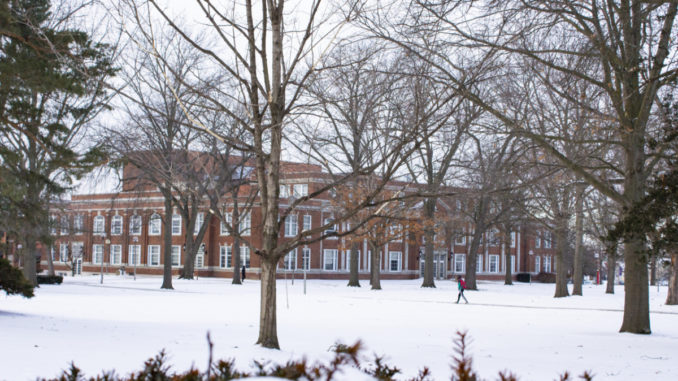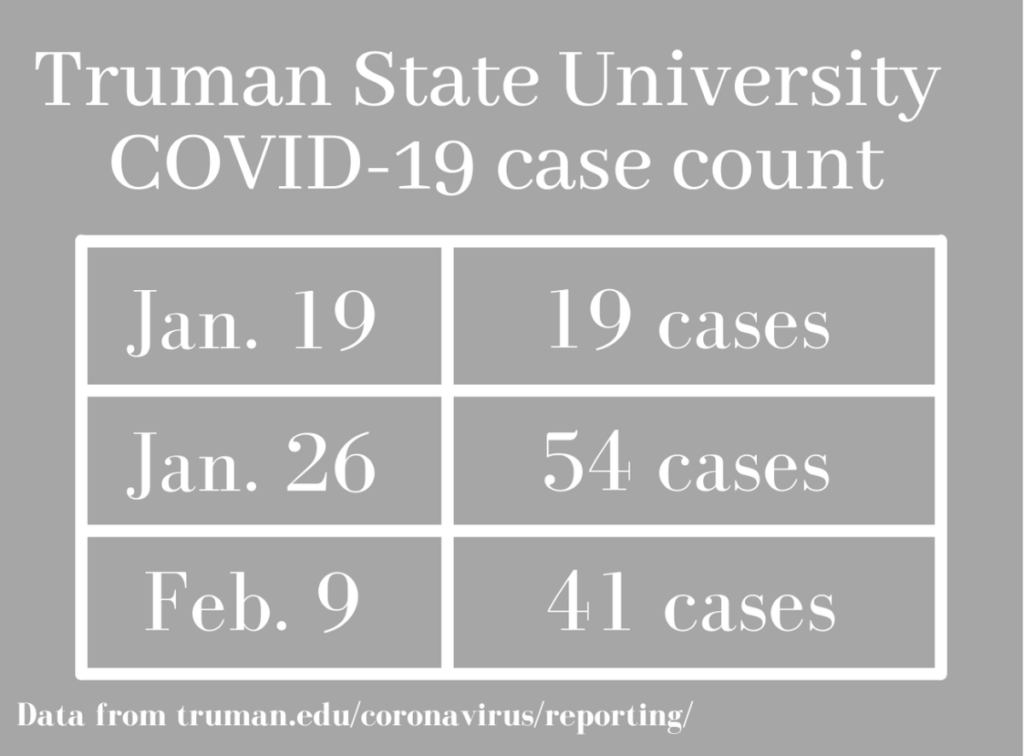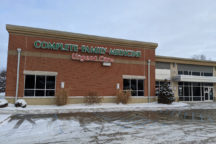
Truman State University more than doubled its weekly case numbers last week.
The week of Jan. 19, campus saw 19 new cases; the following week, the number jumped to 49 student cases and five employee cases. This week the number is at 41 new cases.
“This past week has been a little worrisome, as our numbers have more than doubled,” Brenda Higgins, associate vice president for student health & wellness, said. “This is higher than we had all of last semester, so we are concerned.”
Higgins said she believes the rise is a result of students feeling fatigued from the regulations. She said we all want to return to a normal lifestyle again, but we have to keep our eye on the goal of keeping campus open.
Nancy Daley-Moore, assistant professor of health science and member of Faculty Senate COVID-19 working group, said in a Zoom meeting with Scott Alberts, Faculty Senate president and another member of the COVID working group, Jan. 20, that cases for the first week of classes were more connected in a similar pod.
“So now we’re starting to see it spread more at Truman and that’s to be expected,” Daley-Moore said. “I would potentially expect to see an increase next week as well.”
Higgins said community members must stay vigilant because with the highly-contagious variants of the virus, increased precautions might be necessary.
Spring Break and related travel could increase the odds of transmission on campus, Higgins noted. She said that is why students should be planning ahead for break, not where they are going but how to have a safe and enjoyable time.
“We hope we can stop the trend of doubling from week to week,” Higgins said.
On the positive side, Higgins said testing is going smoothly thanks to the integration of testing at more sites around town. The Student Health Center, HyVee, Walgreens and Complete Family Medicine are offering COVID tests.
No student should be out there saying they cannot get tested, Higgins said. She also expressed that Truman’s contact tracing is going phenomenal.
Adair County has discontinued contact tracing outside of household contacts. Instead, they are advising the positive cases to notify anyone that they were within 6 feet of up to two days prior to the positive individual having symptoms.
Daley-Moore and her students conduct the contact tracing program on campus. Higgins said the contact tracers are IDing positive contacts and reaching out to them to get tested quickly.
“I will say the data from contact tracing — they’re not getting it from class now, and where they’re getting it is because they went and studied at the library or they went to someone’s house,” Daley-Moore said. “That is how students are getting it. It is not in the classroom.”
Daley-Moore said her contact tracers have seen one or two cases stem from the classroom because of a lack of separation between students.
“[We need to recognize that] most of the spread is happening when people are not symptomatic,” Daley-Moore said. “So we need the assumption that everybody has it. Everybody around has it, and if we navigated the whole world like that, we’d have fewer cases.”
Listen to this week’s episode of Dry Ink on this story
Higgins said the COVID spread on campus is from close contact among students or community spread among Adair County.
Higgins said the county’s numbers are high, and since the Truman community is part of Adair County our numbers will reflect that.
Higgins said unfortunately, there is a lot of resistance in this community to mask-wearing, so when community members go to Walmart or the grocery store, they put themselves at risk.
Higgins said even though campus numbers are up, she can see that masking has almost become second nature to students.
“We are doing a really good job on campus; we have to carry the same practices with us off campus,” Higgins said.




